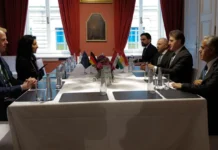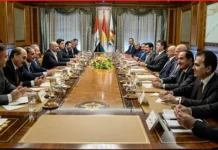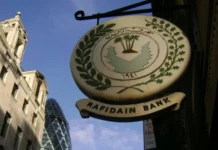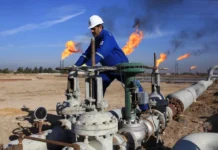Tishwash: BRICS Development Bank Vice President: The process of abandoning the dollar is underway
Paulo Batista Nogueira, Managing Director of the International Monetary Fund and Vice President of the New Development Bank, confirmed on Monday that the process of abandoning the dollar, or what he described as “dollarization,” is already underway.
He noted that the dollar is expensive and risky, and that the United States is undermining its credibility through its behavior.
“Expanding the bank is essential, and expanding the political structure of the BRICS group is another matter,” Nogueira told Sputnik on the sidelines of the Valdai Discussion Club.
“We have always sought to achieve the primary goal when the bank was established in 2014, which was to increase the number of member states to become a bank for the Global South. This goal has been achieved very slowly, but it is continuing.”
The economic expert pointed out that countries are working to expand bilateral trade in national currencies and avoid using the dollar within the banking system.
He added, “The process of de-dollarization is already underway in several aspects. One of them, in particular, is this: Countries are bypassing the dollar and conducting their transactions directly in their national currencies.
This is happening both within and outside the BRICS group. Why? Because the dollar is expensive, risky, and because the United States is undermining its credibility through its behavior, so countries are looking for alternatives.”
He explained: “Their dollar reserves are being diverted to other applications. Trade is conducted and increased in national currencies, and eventually, in my opinion, we will need to move toward a new reserve currency.
But that is a matter for the future. Now, we see the US administration trying to punish countries that try to avoid the dollar and join the dollarization trend through various trade laws, sanctions, and so on.”
Asked about the likelihood of success of the US methods, Nogueira said, “I don’t think these violent methods used by the Trump administration will work in the US’s favor. As you can see, countries that are beyond the dollar are not against it.”
“Simply put, they can’t deal with it under the system the United States has in place. I would even say that the main enemy of the dollar is the United States itself, because it has turned it into a political tool. It has turned it into a weapon in the financial system. So, this won’t work.
When the dollar was truly a reliable international currency, it was through persuasion. Now, they are trying to maintain the dollar’s status as a reserve currency through coercion.”
Regarding the timing of the new BRICS currency’s implementation, the economist said: “Not in the short term, and perhaps not even in the medium term, but it must be clear that when we talk about a BRICS currency, we are not talking about a common unified currency like the euro.
No, that’s not the case. What can be done, and what a number of people have proposed, is a common reference currency for international transactions that replaces the dollar, as an alternative to it.”
He concluded, “There is something that is sometimes difficult to explain, but is very important, which is that these transactions in national currencies do not reach a specific limit. They are not effective in the medium term.
Why? Because they do not allow countries to record persistent trade imbalances with each other. Therefore, we need a new reserve currency, one that will be an alternative to the dollar.” link
************
Tishwash: Al-Sudani’s office: American companies have turned to investing in Iraqi oil and gas fields.
The Iraqi Prime Minister’s Office revealed on Monday, September 29, 2025, that American companies are interested in investing in oil and gas fields in Iraq, while also stating that several investment opportunities have been referred to international and local companies.
Ali Razouki, Deputy Director of the Prime Minister’s Office and Chairman of the Supervisory Committee of the Iraq Investment Forum, said in a statement followed by Al-Jabal that “the Iraq Investment Forum has witnessed remarkable successes by attracting major international companies in the fields of oil, industry, agriculture and other investment sectors.” He explained that “this success reflects the security and economic stability that Iraq enjoys, which creates an attractive environment for investors.”
He added, “The National Investment Commission previously indicated its success in attracting no less than $100 billion in local and foreign capital, but this figure is expected to rise steadily after the forum.”
He continued, “The forum included dialogue sessions with a number of specialists to explain Iraq’s investment philosophy and the directions of the relevant ministries, in addition to holding workshops that highlighted available investment opportunities in cooperation with relevant companies.” He emphasized that “the forum resulted in the referral of several investment opportunities to international and local companies, which is a tangible achievement.”
Razouki pointed out that “after this forum, Iraq witnessed widespread competition among companies for investment opportunities,” explaining that “areas that were globally classified as ‘Red Zones’ are now open to investment after doubts about them were removed.”
He noted that “American companies have headed to Anbar province to invest in some oil and gas fields,” stressing that “the coming period will witness increasing activity in this direction link
************
Tishwash: Government plan to raise non-oil revenues to 20%
Hamoudi Al-Lami, the Prime Minister’s advisor for industry, development, and the private sector, announced on Monday that a new platform for establishing industrial projects will soon be launched within 15 days. He also indicated that plans are being developed to increase non-oil revenues by 20 %.
Al-Lami said in a statement monitored by “Mil” that “the government is counting on the private sector to be the main driver of the national economy by investing idle capital,” noting that “the volume of investments has reached $102 billion so far, while the government aims to raise it to $450 billion by 2030 as part of the development project .”
He explained that “the private sector is influential and significant in investing capital, as much of it remains outside Iraq or frozen in banks, and has not been invested in industries that require a long time to generate profits .”
He added, “Any industrial project requires at least four to five years to begin production and two to three years to generate returns, which was a challenge under previous unstable conditions.” He noted that “the current situation is witnessing a revolution in the industrial sector, which will be a major driver of the economy and will provide tens of thousands of job opportunities, in addition to providing resources to the state treasury by attracting Iraqi and foreign capital .”
Al-Lami pointed out that “the government has prioritized combating administrative corruption through automation. Within the next two weeks, the Prime Minister will launch an electronic platform that will shorten the time required to obtain a license to complete the establishment of an industrial project from two or three years to just 15 days, by consolidating the required approvals from 14 to 18 entities into a single portal,” according to the official news agency .
Al-Lami revealed “facilitations for bringing in foreign workers, as Syrian and Bangladeshi workers and other technical experts will now be permitted, after previously being prohibited, in order to encourage investors and remove obstacles to their projects .”
Regarding the private sector’s contribution to GDP, Al-Lami stated that “non-oil revenues increased from 7% in 2020 to 14% currently, thanks to government measures and automation, with efforts to reach 20% in the coming months.” link





